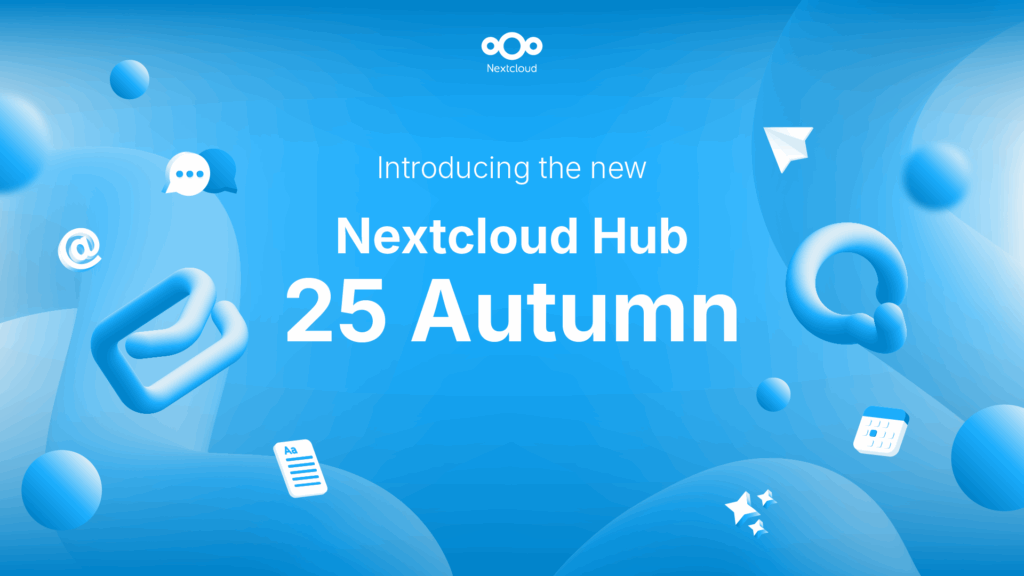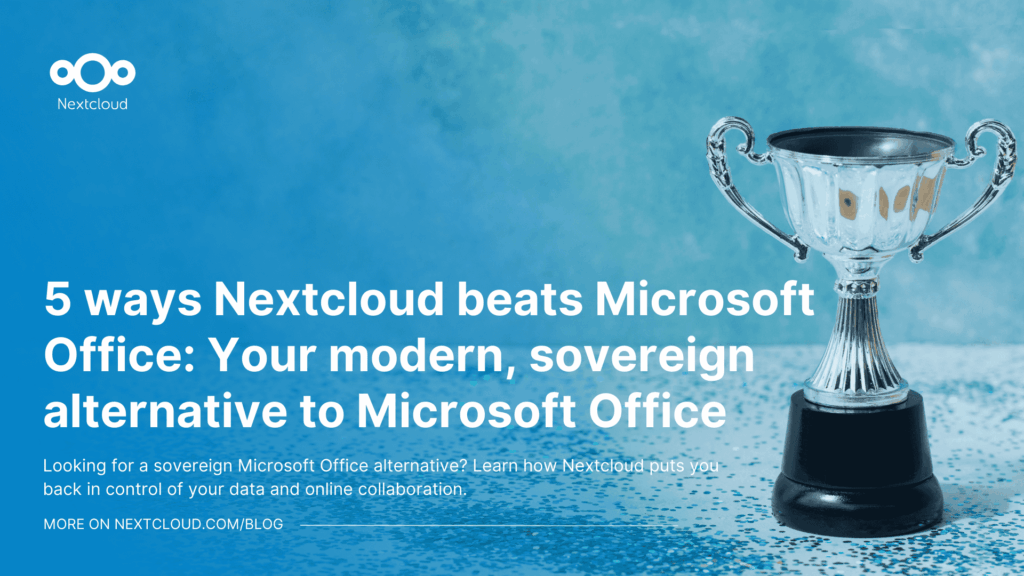With our recent announcement of Roundcube joining Nextcloud — psst.. you should definitely read that post for additional context! — both projects’ founders shared their thoughts and additional context on the motivations to have Roundcube find a new home with Nextcloud.
A little context
Roundcube‘s initial release was in 2008 – 15 years ago! – yet this open source webmail software project is still deeply important in today’s tech landscape.
Though many of us may want to escape email for other messaging platforms, the ever-ubiquitous email is just as relevant today as it has been in past decades. As a catch-all for our digital lives and as the central identifier for most of our online identities, the presence of email in today’s internet is still a strong one. As Fortune reinforced recently, email continues to be a cultural staple of communication, especially in the business world. When you consider email is 50+ years old… Roundcube is comparatively in it’s infancy!
It’s not hard to imagine email continuing to play this role as it has for the last half-century, and we feel there is also an opportunity and obligation to keep decentralized email alive too. We’ve seen such a dominating push toward centralized email services in the last decade, especially toward Gmail. We believe it’s extremely important to keep email decentralized, especially for those who value the privacy of their personal and professional communications. That said, Roundcube is an impressively large and important player in the role of email sovereignty, so keeping the project and community healthy and active feels like a natural extension of the values here at Nextcloud: to support decentralized, open source technologies that help everyone take control of their privacy and independence.
Ask the founders…
Frank Karlitschek, CEO and Founder of Nextcloud, and Thomas Bruederli, founder and head developer of Roundcube, answer a few questions to provide insight into the merger:
Thomas, you started Roundcube over 15 years ago. What was your motivation back then to build a webmail client and how do you feel about it now, given it’s one of the most popular mail clients in the world?
Thomas: It all started with the lack of a freely available „modern“ webmail application and my fascination for the new possibilities with web browsers that went beyond just displaying formatted text.
I feel proud of what grew out of this personal side-project and it backs my strong belief in free software and the importance free software still has in our connected world. Apparently I did a few things right although there was no big plan or vision behind it all. It just happened naturally and that’s just a great story.
You’ve decided to step down as maintainer for Roundcube. Why is that?
Thomas: With the birth of our kids my focus how to spend my off-work time clearly moved towards family life and thus I gradually stopped contributing and I lost track of what’s happening in the project.
The Roundcube project deserves a better and a more committed lead and therefore it‘s time for me to step back and let go.
What is the motivation for the close collaboration between Nextcloud and Roundcube? Why did you pick Frank and Nextcloud to take over?
Thomas: I‘ve been following the development of Nextcloud and Frank‘s tireless efforts for free software for years. It was the first name to come to my mind when I started thinking about the future of Roundcube.
Frank: When Thomas reached out with the proposal, I was kind of honored. I’ve known Roundcube for a long time, and used it in the past — it is obviously a well known project with a long history. It isn’t as visible as Nextcloud, but very impactful — tons of universities use it, for example, many hosting providers – and even my own Synology NAS has it installed.
Second, I can relate to Thomas and his situation. I have started and contributed to many open source projects, and I have had many times where I was unable to continue to maintain or contribute to them as other things got in the way. Work, family, other projects. And that is always sad.
So for me, my first motivation is to preserve this great project.
Roundcube is used by many big companies all over the world. Did you consider selling it to them instead?
Thomas: Roundcube is free software at heart and giving its control to a business and service oriented entity never was an option. I want the software to remain as open and general-purpose as it is today and I don’t think that a big company can take over that spirit.
Frank: I respect his decision to not hand Roundcube over to some random company — I’m sure many would have been interested. Instead, he cares about the project itself, the future. There, too, I can relate – I have taken great pains in the past to preserve a project I care about and keep it from falling apart!
Thomas, you seem to think Nextcloud and Roundcube fit well together. Why is that?
Thomas: Both projects share the same ideology about the role and importance of free software as an independent alternative to the big cloud service. Besides that, they also have much in common in terms of technology and maturity.
I very much hope that Nextcloud‘s strong community will bring new ideas and drive into the development of Roundcube which has been mainly backed by a single person during the past few years. I was very happy about Frank‘s immediate response and enthusiasm to my proposal and honestly, I couldn’t imagine a better fit.
What does this mean then for the future of Roundcube both from a maintainership and community perspective?
Frank: So, this is a little unprecedented. I mean, open source projects merge sometimes, but it’s not super common. So how this will go from a technical and community level — not everything is clear at this point. But what we’re looking for is, first, to keep everything going at Roundcube, as-is. Second, Thomas and the community have done a great job with limited resources and we want to build on that. So we plan to hire a few people to work on Roundcube in maintaining and improving infrastructure.
For example, we plan to get a communication channel up where people can talk and build community again, this has been down for a while but would be very helpful for collaborating on issues, bug reports, things like that.
Going forward, things depend on the rest of the community of course! What they can contribute, what direction they would like to see, what features or fixes are needed.
Does Nextcloud have plans to commercialize things around Roundcube?
Frank: That’s a good question, but we have no plans for that, for now. If there are opportunities, ways that fit with the community, and that would allow us to hire more people to work on Roundcube, then we would consider it. But it has to be a win-win, like with Nextcloud! We’re looking to improve Roundcube and do what’s good for the project in the long run.
Nextcloud already features and maintains Nextcloud Mail. Is Roundcube under Nextcloud GmbH’s care seen as a form of acquisition that may replace or otherwise inform Nextcloud Mail?
Frank: There’s an important difference between what typically occurs in Big Tech acquisitions compared to open source projects. We’ve all seen so many startups get gobbled up by the biggest of the tech giants, never to see the light of day again. In projects like Nextcloud and Roundcube, a deeply open-source way of life means that incentives are quite different. Acquisitions usually happen to gain intellectual property or for financial reasons, but that’s far from what’s happening here, and even impossible in the case of IP – the software is all developed in the open!
Instead Nextcloud is providing Roundcube with a new home, so to speak, by hosting the project, providing investments in talent, development, community resources. The goal is to allow Roundcube to exist and flourish for many years to come, even in areas where both Nextcloud and Roundcube differ. There are no short-term plans for merging, and Roundcube will not replace Nextcloud Mail.
Nextcloud already features Nextcloud Mail — why place resources into a project like Roundcube? How do both webmail offerings complement each other? Do they each offer a unique set of features from one-another that Nextcloud sees as strategically beneficial in the content collaboration landscape?
Frank: Firstly, Roundcube is simply an important open source project — tons of people from Harvard University to the Tata Institute of Social Sciences in Mumbai use Roundcube as their institution’s chosen webmail solution. There are also countless hosting companies around the world, like OVH who bundle Roundcube with their CPanel offerings.
As a modern webmail offering already within Nextcloud Hub, Nextcloud Mail is a powerful client in its own right. We do not plan to merge them, and as open source projects, the possibility to collaborate already existed previously. In fact, both do share some code in the underlying back-end, I believe, and perhaps that possibility may expand a bit now that the projects are closer. But we have no plans to abandon either Nextcloud Mail or Roundcube in favor of the other. Nextcloud Mail makes a ton of sense if you use Nextcloud heavily, while Roundcube is an important stand-alone product with many users.
Will Thomas still be part of the Roundcube project after the transition? What about others who contribute? Who will replace him as maintainer?
Frank: So Thomas will dedicate himself to his family and job, though I hope to still see him at events, or perhaps an occasional code drop! For the other contributors, I hope and think they will continue to contribute. We offered some existing contributors a job, but they were already doing other things so they will stay community members. Hopefully, when we hire people who start moving Roundcube forward faster, we can grow the community, too.
Technically, I’ll be the maintainer, like I lead the Nextcloud project, going forward.
How will Nextcloud ensure the Roundcube project can survive long term, i.e. not succumb to economic or financial pressures of the current tech industry in a few years? Put differently, what is the guarantee of longevity for Roundcube in this new partnership?
Frank: While we can’t ever make guarantees, Nextcloud has a long and deep history in open source, and a successful one at that! We’re committing to being stewards of Roundcube as, what we believe, is a deeply important project and community in today’s world. The tech industry can certainly be challenging, but open source projects have proven to be uniquely resilient in ways that we think are really helpful.
Will this mean any changes for current users of Roundcube, or hosting companies around the world? How will these changes affect those users and hosting businesses? The developer community?
Frank: We’re seeing Roundcube and Nextcloud as unique projects — we’re happy that Roundcube can continue it’s success with a little help from Nextcloud, but we don’t plan to make big sweeping changes to an already successful way of life for the project. The best thing we can do is add to those successful strategies, and we hope by sharing our passion for Roundcube that even more people discover it, and even grow to love it too.
Dive in to learn more about Roundcube and it’s modern webmail offering:
Read our announcement blog for more details:
Read our official press release about the merger between Nextcloud and Roundcube:




